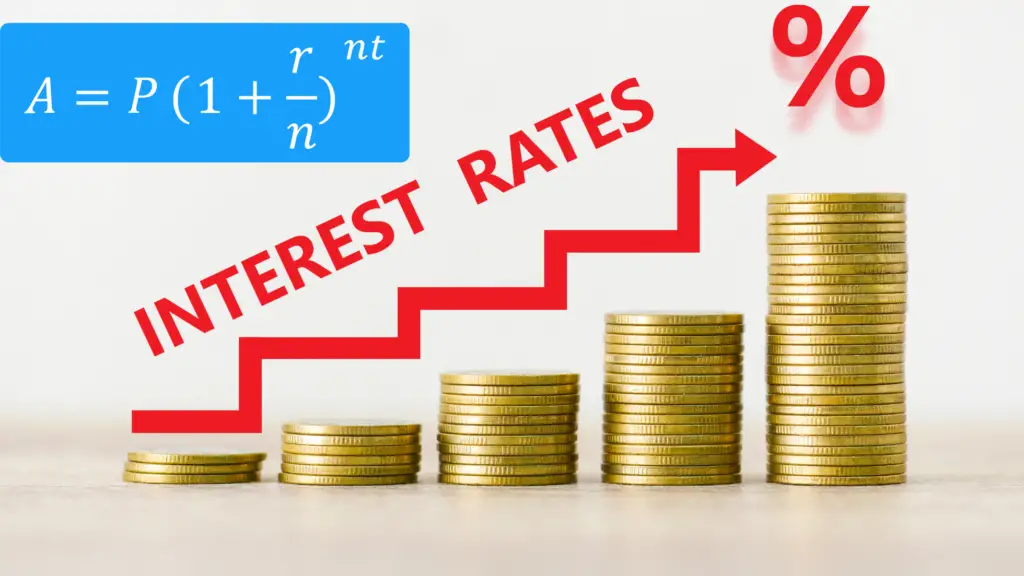Table of Contents
Overview
Compound interest is frequently praised as a tool that can significantly contribute to accumulating wealth in the long run. Exploring how compound interest functions when it comes to savings accounts or investments can truly make a difference, for individuals who are committed to expanding their resources. This piece aims to delve into the concept of compound interest while highlighting its advantages and offering insights, on how you can leverage it to grow your wealth.
What Is Compound Interest?
Compound interest refers to the interest computed not only on the amount but also, on the previously accrued interest from earlier periods—a sort of “interest on interest” concept that helps your funds grow more rapidly over time as it accumulates further interest, with each cycle of compounding frequency.
The Formula for Compound Interest
The compound interest formula is:

- A = The amount representing the projected value of the investment or loan.
- P = The principal investment amount (the deposit or loan amount)
- r = The annual interest rate is represented by “R”, in form.
- n = The variable ” n ” represents how frequently the interest is compounded each year.
- t = The duration for which the money is invested or borrowed is represented by ” t ” in years.
The Power of Time in Compound Interest
One of the elements that impact the development of compound interest is time duration. It’s advantageous to commence investing or saving early as it allows your money more time to increase. With each compounding cycle, the interest gained is included in the amount resulting in a growth rate.

Let’s examine a scenario using the table provided to demonstrate the significance of time, in compound interest calculations.
Table: Compound Interest Growth Over Time
| Year | Principal | Annual Interest Rate | Interest Earned | Balance |
|---|---|---|---|---|
| 1 | $1,000 | 5% | $50 | $1,050 |
| 2 | $1,050 | 5% | $52.50 | $1,102.50 |
| 3 | $1,102.50 | 5% | $55.12 | $1,157.62 |
| 4 | $1,157.62 | 5% | $57.88 | $1,215.50 |
| 5 | $1,215.50 | 5% | $60.78 | $1,276.28 |
This table works under the assumption that no extra funds are added and interest is calculated yearly.
Compound Interest in Savings Accounts
Numerous banks provide savings options that grow with interest payments. Let you enjoy the wonders of compound interest magic! While savings account interest rates tend to be modest the gradual increase, in funds, over time can count for something especially when you kick things off early and keep adding to your account regularly.
- Tip: Consider searching for high-yield savings accounts or certificates of deposit (CDs that provide interest rates and enhanced compounding potential.
Compound Interest in Investments
When dealing with investments compound interest plays a role, in boosting the growth of wealth. Stock markets, mutual funds, bonds, and exchange-traded funds (ETF) are avenues, for compound growth especially when the profits are reinvested.
- Stocks and Mutual Funds: When you reinvest dividends and capital gains, in stocks and funds you allow your investments to build up over time resulting in profits, from both the investment and the earned returns.
- Bonds: Investors often find long-term bonds due, to the advantages of compound interest accumulation over time with the interest being reinvested to boost earnings from their initial investment.
The Time Value of Money
The idea of the time value of money is tied to interest, which implies that money in hand today holds more value than the same amount, in the future due to its potential, for investment and interest growth Knowing this concept can guide you in making wise financial choices.

Compound Interest vs. Simple Interest
Distinguishing between compound interest and simple interest is crucial because compound interest grows significantly by reinvested earnings, over time compared to interest that is calculated based on the principal amount.
For example:
- Simple Interest: A $1,000 investment at 5% simple interest for 5 years would earn $250 in interest, resulting in a total balance of $1,250.
- Compound Interest: The same $1,000 investment at 5% compound interest for 5 years would grow to $1,276.28 due to the “interest on interest” effect.
Benefits of Compound Interest for Wealth Building
- Exponential Growth: Investing for a period leads to accelerated growth, in your assets due, to the phenomenon of exponential growth.
- Low Effort, High Return: Invest wisely and watch your money grow effortlessly with compound interest – it’s a way to boost your returns without any work, on your part!
- Power of Reinvestment: The benefits of reinvestment are evident, in the maximization of growth potential, from your earnings.
- Risk Mitigation: To manage risks better compounding can help reduce the impact of market fluctuations, over extended periods.
Strategies to Maximize Compound Interest
- Start Early: When you start investing or saving early on the opportunity your money gets to grow over time.
- Contribute Regularly: Make deposits into your savings or investment accounts to increase the power of compounding over time.
- Reinvest Earnings: Make sure to reinvest any dividends received along, with interest and capital gains to maximize the benefits of compound growth over time.
- Choose High-Interest Accounts: Consider selecting accounts or investments that provide interest rates and compound frequently whenever you can.
Conclusion: Compound Interest as a Wealth-Building Tool
In the realm of managing personal financesconsider compound interest as a tool, for growing wealth over time. To make the most of its advantages focus on allowing time and making contributions consistently. With a grasp of how compound interest works and putting it into practice you can pave the way, towards freedom and lasting prosperity.
FAQs :
1. Is it possible for compound interest to end up working to your disadvantage?
A. Certainly! Compound interest may pose a challenge when dealing with debt situations, like loans or credit cards because the longer it takes to clear the debt owed amount entirely; the more interest builds up over time making it increasingly difficult to settle the sum borrowed.
2. What causes compounding to happen in finance and how can one prevent it effectively?
A. When your debt increases due, to interest accumulating on a decreasing balance like high-interest debt and you’re only making minimum payments on a loan or credit card with an interest rate can lead to the accumulated interest to surpass the payments made which causes the debt to grow or decrease. To prevent this from happening strategies such as paying off debt aggressively consolidating debt, for interest rates, and refraining from high-interest borrowing can be beneficial.
3. What is the relationship, between inflation and compound interest when it comes to long-term savings or investments?
A. Over time the cost of living increases, to inflation is a threat to the worth of compounding interest earned from investments where the inflation rate surpasses the interest rate leading to a potential decline in savings value even with the compounding effect highlighting the importance of knowing the real interest rate adjusted for inflation to understand true growth, in purchasing power of investments.
4. How do taxes affect the development of investments, with compound interest, and what methods can be used to optimize compounding over some time?
A. Taxes can eat into the gains, from compound interest by lowering the interest earned each year. Taxation of interest income on a basis can limit compounding potential. Consider tax approaches such as putting money in tax-deferred accounts (like 401(k) IRA) or tax-free accounts (such as Roth tactics can boost the power of compounding as your interest grows without yearly taxation hopefully resulting in much bigger profits, in the long run.









As a Newbie, I am permanently browsing online for articles that can be of assistance to me. Thank you
Really well written
Clear explanation
What resonated with me most was your point about the importance of small consistent actions. It’s easy to overlook how these tiny steps accumulate over time. Your personal story really brought this home in a way that statistics alone couldn’t.
I’ve been following this issue for a while, and your analysis adds a crucial dimension I hadn’t considered before. The historical context you provided helps explain current developments in a way that’s both clear and compelling. This has given me much to think about.